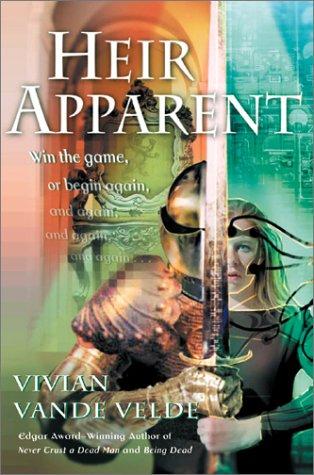Heir Apparent, by Vivian Vande Velde
Jan 30
2007

While many fantasy fans will enjoy Vivian Vande Velde’s YA novel Heir Apparent, it will resonate most with readers that are familiar with fantasy-based computer games. If you’ve ever happily played a Sierra game into the wee hours of the night (particularly one of the earlier ones—the kind that you could play for ages without realizing that you’d screwed everything up by missing out on some ridiculous item five minutes in), this is definitely the book for you.
The heroine of Velde’s novel is a fourteen-year-old girl named Giannine, who receives a gift certificate to a virtual reality gaming center for her birthday. She chooses a game with a classic fantasy set-up: the main character, who has grown up in a simple country family, discovers that he or she is secretly the first-born child of the king, and must now step forward and assume the throne. The object of the game is to make alliances in the castle, find solid counselors, and survive long enough to be crowned king. Unfortunately for Giannine, the game also features many, many ways to get killed—everything from being eaten by a dragon to getting assassinated by unhappy half-siblings—and she experiences nearly all of them first-hand.
Velde writes with droll, easy style, and she’s obviously played a few fantasy games herself. In this scene, Giannine is wondering how to convince the magical statue of Saint Bruce the Warrior Poet to give her the ring he has stashed somewhere in his chain mail, and Feordina, the keeper of Saint Bruce’s shrine, is explaining the process:
Sadly, Giannine learns the hard way that Saint Bruce doesn’t accept just any poem.
There’s a minor subplot about the dangers of censorship (and the last page of the book doubles as a protest sign that reads, “Don’t corrupt the minds of our children! Down with fantasy!”), but Velde is too deft a storyteller to waste time being overly preachy. Heir Apparent is smart, strange, and funny, and is guaranteed to appeal to fantasy readers of all ages.
The heroine of Velde’s novel is a fourteen-year-old girl named Giannine, who receives a gift certificate to a virtual reality gaming center for her birthday. She chooses a game with a classic fantasy set-up: the main character, who has grown up in a simple country family, discovers that he or she is secretly the first-born child of the king, and must now step forward and assume the throne. The object of the game is to make alliances in the castle, find solid counselors, and survive long enough to be crowned king. Unfortunately for Giannine, the game also features many, many ways to get killed—everything from being eaten by a dragon to getting assassinated by unhappy half-siblings—and she experiences nearly all of them first-hand.
Velde writes with droll, easy style, and she’s obviously played a few fantasy games herself. In this scene, Giannine is wondering how to convince the magical statue of Saint Bruce the Warrior Poet to give her the ring he has stashed somewhere in his chain mail, and Feordina, the keeper of Saint Bruce’s shrine, is explaining the process:
“...the rightful owner—and according to you, that’s you—can call it forth.”
“How?”
“Why, by reciting poetry, of course.”
Of course.
I asked, “You mean like”—I paused to remember—“’Listen, my children and you shall hear/ of the midnight ride of Paul Revere’?”
“Cute,” she said, “though a bit short.”
“No, that wasn’t the whole thing.” I started panicking because I didn’t know the whole thing. I’d just said all I remembered. Did I know any poem in its entirety?
No matter, for she said, “But it has to be a poem of your own making.”
“Oh,” I said. How hard could that be?
“Of course,” Feordina said, “if Saint Bruce doesn’t like your poem, he chops your head off.”
Sadly, Giannine learns the hard way that Saint Bruce doesn’t accept just any poem.
There’s a minor subplot about the dangers of censorship (and the last page of the book doubles as a protest sign that reads, “Don’t corrupt the minds of our children! Down with fantasy!”), but Velde is too deft a storyteller to waste time being overly preachy. Heir Apparent is smart, strange, and funny, and is guaranteed to appeal to fantasy readers of all ages.
Posted by: Julia, Last edit by: Julianka
No new comments are allowed on this post.
Comments
No comments yet. Be the first!